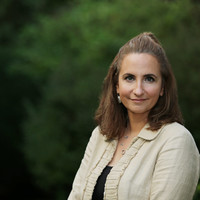After the first day of kindergarten, my son asked me each day, for weeks, why he had to go to school.
"Because you need to learn," I told him.
"I can learn at home," he replied.
"Because we want you to make friends," we tried.
"I already have friends," he responded.
"Because Mom and Dad will get in trouble if you don't go to school," we explained.
"You can teach me at home." Volley returned.
Finally, desperately, I resorted to words that I'd heard so often from my own parents I vowed never to repeat them:
"Because I said so."
It's come to that. I anticipate I'll soon be complaining about the prices at restaurants and needing help with the remote control.
But even if that's true, even if I am slowly turning into my mother, I'm seeing the wisdom of "Because I said so" more lately — particularly, for example, when I think about mask and vaccine mandates.
For those who refuse, it's not enough to hear from epidemiologists and public health professionals that masking and vaccines, particularly when some are too young to be vaccinated and many health conditions lower vaccine efficacy, are crucial to stopping COVID.
It's not enough because, thanks to our solipsistic culture, we've convinced ourselves that we must be convinced to follow the rules.
We must comprehend. We must agree.
Admittedly, blind obedience to authority has its dangers, and the government is not our Mommy and Daddy. I understand, if not share, the impulse to view with skepticism new and complex science. I appreciate, if not share, the thinking that, with enough research, we can educate ourselves in all matters.
But we all put our faith in others, in experts, in those who have training or education or experience that we lack. We all trust.
We trust the carpenters who build our homes, trust that they know more about erecting sturdy structures than we do.
We trust the engineers who design our cars, trust that they've tested the seat belts and airbags to protect us in a crash.
We trust the cooks in restaurants, trust that they've handled the food safely and sanitized their equipment to avoid getting us sick.
We trust because we must. Because we can't do it all, can't know it all, can't be it all.
There are missing pieces in all of us. It's why we marry. It's why we adopt dogs and have children, why we attend church and read books and listen to music.
We need love. We need to be entertained and inspired and distracted. We need the pieces we lack, and we get them from outside ourselves.
Without these missing pieces — and the pieces are different for each of us — we cannot live our lives as they're meant to be lived. To complete ourselves, our lives, we need other people and other things.
If that's too esoteric for you, how about this?
Society is a division of labor, like the one in my house where my husband washes the dishes and I do the laundry. The compartmentalization lubricates the machinery of daily life. It also strengthens our bonds to need each other, to rely on someone else.
The labor done by doctors, scientists and drug manufacturers over the last 18 months has been nothing short of miraculous. They have developed lifesaving treatments and preventative medicine, and in the gigantic family that is our society, we now must do our part. We do it to protect ourselves, but more importantly, to protect us all.
Ultimately, when we ask ourselves "Why?" the answer is simple: Because they said so.
To learn more about Georgia Garvey, visit GeorgiaGarvey.com.
Photo credit: WiR_Pixs at Pixabay






View Comments